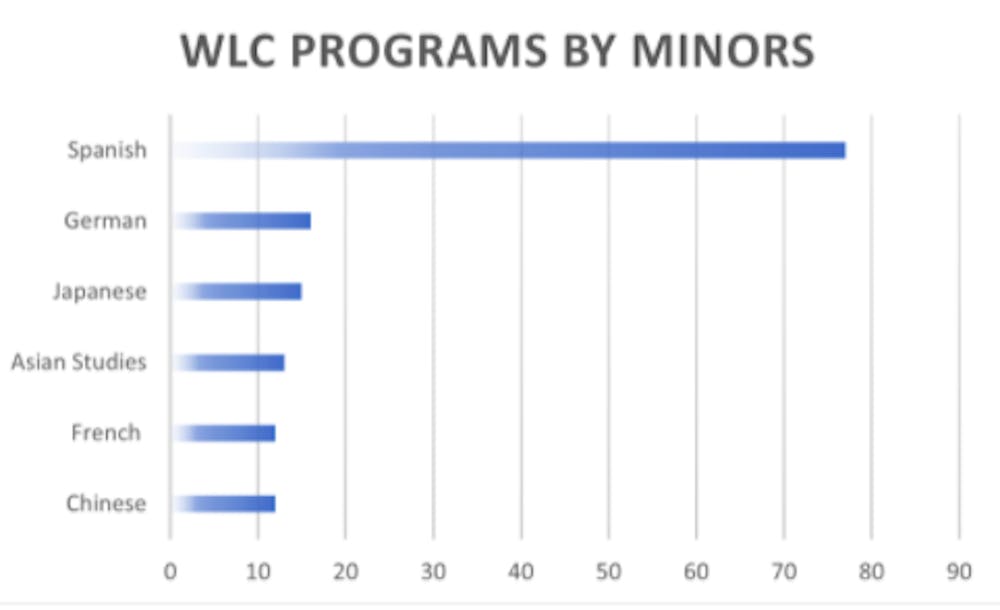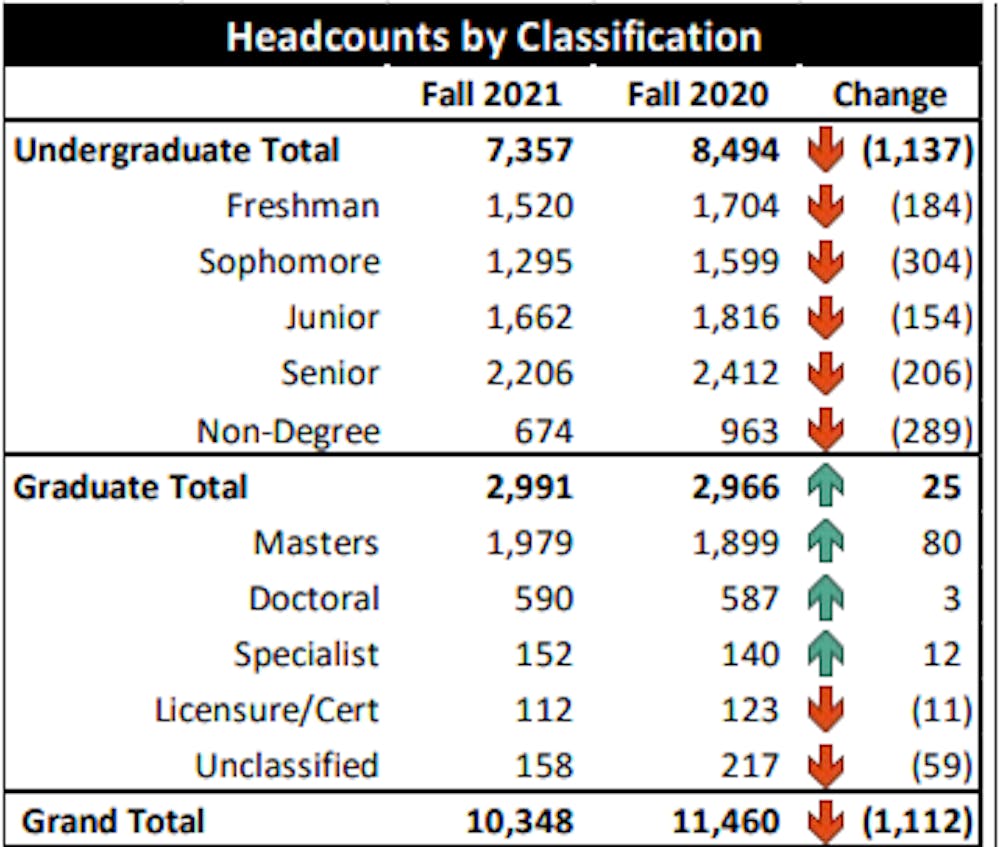
The spring semester was only a few weeks underway when Laura Connolly, the dean of humanities and social sciences at the University of Northern Colorado, began to let people know about the university’s intention to shut down the French, German, and European studies programs.

It was not a loud announcement. Professors who teach classes within the programs were told in the second week of January, with strict instructions not to spread the word. Other professors across the HSS department opened their emails nearly a month later to see a brief email about the closures. It took a few more days for students in the targeted programs to receive an email of their own, this one even more brief. And many had already heard the news secondhand, from professors, classmates, work supervisors or even an article in the Greeley Tribune.
University officials’ decision to end these programs hasn’t been widely announced yet, and the World Languages and Cultures website still claims to offer French and German, even though those programs are not open for enrollment. Several HSS members, students and staff alike, agree that the slow trickle of information from Connolly’s office isn’t enough to explain the sudden decision to close these three programs. French professor Christine Moritz voiced the worries that have been circulating around the World Languages and Cultures department for the last few weeks:
“The question that needs to be asked is why this department? Why these programs? Why now?” Moritz said.
Moritz’s questions aren’t easily answered. Connolly’s explanation, echoed by President Andy Feinstein in an interview with Bear News in February, is that enrollment in these programs has been “chronically low,” mirroring trends in universities across the nation, and there isn’t hope of improvement. This was the official statement in the Greeley Tribune article that mentioned the closures, and on its own, the statement is barely remarkable. But a closer inspection reveals how much context the dean’s statements are missing.
It is true that enrollment rates across UNC have decreased since the onset of COVID in 2020. But a closer look at official UNC enrollment reports brings into question why the French, German and European studies programs are being targeted specifically for low enrollment rates, when the issue spreads far beyond those programs.
According to the Fall 2021 Final Enrollment Report, https://www.unco.edu/institutional-reporting-analysis-services/pdf/enrollment-stats/Fall2021Final.pdf, UNC’s undergraduate population decreased by over a thousand from fall 2020 to fall 2021. The report’s data shows that the decrease is similar among undergraduate populations, from freshmen to seniors. But the report doesn’t cover enrollment statistics based on students per program. Some of that information is found on the UNC Enrollment Data website, https://www.unco.edu/president/planning/data/enrollment.aspx, but those reports only go up to 2018, an example of the university administration’s lack of transparency that Moritz points out. In 2018, the European studies program hadn’t even been instituted, and every foreign language student is counted together, regardless of program. There’s no way to separate data for French and German students from students in the continuing Spanish, Japanese and Chinese programs. The information that university officials are citing to validate their decision to shut down these programs is very difficult to find.

Enter the World Languages and Cultures 2021 Department Review, not available online. The review shows that the number of students enrolled in classes in the WLC department is on par with its HSS counterparts, even exceeding enrollment numbers in anthropology, economics and political affairs. Although there are fewer students majoring in French and German than other languages, several classes those programs offer are required for majors housed in other departments, like music and international affairs. And despite their low enrollment rates for majors, there are more students minoring in German than in Japanese, Chinese or Asian studies, and as many students minoring in French as Chinese.
Another trend that doesn’t line up with officials’ claims is graduation rates. Though not an official document, UNC’s May 2020 graduation program lists 64 majors with less than 10 graduates. Included in that list are several majors from the WLC department, but the lowest is Spanish teaching with two graduates. Of the nine majors listed with one graduate, none are from WLC. These graduation rates are in line with the decrease in enrollment across the university, but do not prove that French, German or European studies are worse off than other programs.
“They’re putting that in the newspaper as if it’s unusual, but the point is that it’s not,” Moritz said of the statistics in the Greeley Tribune article. “We’re partly struggling because everyone’s struggling.”
There is more information available about the French and German programs than there is about the European studies program. That’s because it’s very new - the program offered its first classes in 2020. The students that will graduate at the end of this year with degrees in European Languages and Cultures will only be the second class to do so. One of those students is Neal Jeppeson, who’s been very involved in the European studies program. He expressed the anger that he shares with many of his classmates that his program is being shut down seemingly randomly, while university officials triumph keeping others open.
“A bank robber can’t kill two hostages and then claim to have saved the other three,” Jeppeson said.
Like others, Jeppeson heard that his program was closing by word of mouth, and expected the email that came a few days later. He described his reaction as “disappointed, but not surprised,” citing other decisions the administration has made in the last four years that he says show how little they value education. Many of these decisions involve finances and the university’s debt. The $74 million Campus Commons building is the target of frequent eye-rolls from students who feel like the tuition they pay is being poorly spent, as well as last semester’s closure of Tobey-Kendel Dining Hall despite plans to install several new retail dining options. Jeppeson says that these decisions are the result of an administration that is more concerned with the money the university makes rather than the education it provides.
“Trying to administrate a university like running a business is in itself a conflict of interest, because all of the sudden you don’t have students, you have customers,” Jeppeson said.
Jeppeson isn’t the only person to think that financial troubles may be a factor in the decision to close these programs. It’s a sentiment that he says is shared among many of his classmates, as well as professors like Moritz. Moritz says she was blindsided by the decision, and it reminds her of the administrative reorganization in 2020 that put dozens of university employees out of a job.
Mark Anderson, the provost at the time, said that the conversation around the reorganization must be “mindful of the university’s budget,” implying that the layoffs were due to cost. Moritz says this feels like a similar move. She also says she had no warning that this was coming, which calls into question Connolly’s statement that department faculty were included in the decision process.
“I feel angry, I feel ambushed, I feel deceived and I feel extremely sad,” Moritz said.
The surprise of the dean’s announcement was not the only thing that impacted French, German and European studies professors. For many, the end of the programs means the end of their employment at UNC. According to Moritz, the application season for jobs in academia is in the fall - in other words, it just ended. This leaves professors nearly a year without being able to apply for another job. It’s also unclear how much longer their employment will last. Connolly says that although all three programs are closed for new applicants, current students will be “taught out” so they can graduate with their intended degree, but professors aren’t sure how long this will take, whether it be a few semesters or a few years.
To add to the uncertainty, Jeppeson said that he doesn’t know anything about the process a university must go through to cut programs. But Moritz revealed that there isn’t one. She’s spent six years on the curriculum committee, and is familiar with the process of adding or cutting classes. Each proposed curriculum change must be reviewed by the committee, the dean of the affected school and the registrar, and the staff member filing for the change must provide impact statements that detail how the addition or subtraction of the class would impact other programs across the university. This process is detailed in the Board of Trustees University Regulations document, which lacks information about how to cut an entire program. Moritz says that university officials aren’t following the process for cutting classes because they don’t technically need to. This loophole gives Connolly and other officials like interim provost Lisa Vollendorf the opportunity to make this decision without review and without any impact statements for students and staff.
Jeppeson is far enough through his education that he will not need to adjust his class schedule like other students might, but he says he is still immensely disappointed that all three programs are closing, especially the European studies program. He discovered the major when he took German 101 his freshman year and never looked back. He says it offered him an incredibly well-rounded education learning from some of the most knowledgeable people, and he wishes the program could continue benefiting students the way it benefited him.
“Our professors are fantastic,” Jeppeson said. “They’re some of the smartest people I’ve ever met, some of the best teachers I’ve ever had, and I was very lucky to get to learn from them.”
Another potential explanation for the programs’ low enrollment numbers, especially French and German, is that the UNC Liberal Arts Council recently changed the libreral arts core requirements, and 100 level language classes don’t fulfill the new requirements. This means that if a student wants to take a 200 level language class to fulfill an LAC requirement, they must either have already taken that language in high school or be willing to take the prerequisite classes. With fewer students like Jeppeson in 100 level classes, students who are not already in the WLC department are much less likely to discover its programs.
Connolly and other administrative staff have done their best to make it clear that the Chinese, Japanese and Spanish programs are here to stay. Though that may seem like a light in the darkness, their assurances have been met with some doubt. In light of the university’s financial straits, some feel as though it’s just a matter of time until other programs are cut as well, and there’s no way to predict whose head may be on the chopping block next. Moritz especially takes issue with this, as she says the WLC department is the most racially diverse in the school in terms of both students and faculty. She says it seems like the administration thinks it’s okay to cut French and German because they are white European languages, which neglects to take into account the fact that many of her students are native speakers from Africa or native Spanish speakers who want two romance languages under their belts.
Moritz and Jeppeson’s testimonials about the World Languages and Cultures department show how much of an impact the French, German and European studies programs have made on people in the UNC community. They are just two of the many people impacted by these program closures, and there are many others who are waiting on the edge of their seats for university officials to respond to the backlash that this decision has spurned.The closure of the French, German and European studies programs is still a developing story. Anyone who has been impacted or who has information on developments should contact bearnews98@gmail.com or editor@uncmirror.com.







